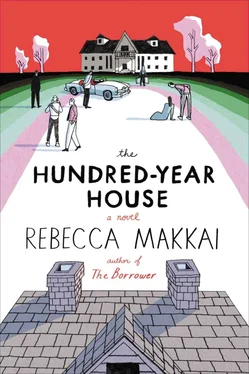Zilla hangs Marlon’s shots next to the shots of Gamby. He’ll be delighted that someone’s done all the work for him.
(Grace, tossing in bed, turning the pillow to the cool side. Dreaming of Rapunzel and fish.)
But a moment later Zilla’s sinking, and she realizes what’s wrong, what it is. A lot of time has passed, and she’s done her job, and Viktor hasn’t followed her here. After Eddie wrote those words, there was a window of maybe half an hour when Viktor might have staggered through the dark, knocked on the door, called her name. But he hasn’t, and the night air has hardened to impenetrable glass.
(Gamby’s head between his knees. He says, “Twenty-five?” And he sits up to sign the paper they’ve made.)
Zilla and Viktor might pine for the rest of their lives, but that is all they will do. They will harden and soften into their old age, and she will paint him a hundred pictures and he will make her a hundred dances, but there will be no words, and there will be no coming together of bodies.
(It’s not till Fannie has escorted Gamby back to the director’s house that the solarium erupts in jubilation. Armand bursts in and says, “We changed fate! Do you realize what we did? It’s — what is it? The victory of art over greed! It is! We reached in and we changed fate!” But Eddie says, “Did we?” Because this whole evening he’s felt himself sucked into a whirlpool of inevitability. “Are you sure?”)
Oh, stupid Eddie with his stupid pen. And stupid Zilla, too, and stupid Viktor. She sits on the floor and stretches her legs. Lemuel is waiting for her, back in Madison. She can feel him, lying in bed awake, waiting. A different kind of magnet.
(Samantha turns a cartwheel, a full cartwheel, into the hall. The skirt of her yellow dress falls over her head like a parachute.)
After a while, the rain lets up.
And a while after that, the negatives are dry.
Dear Miss Mays,
Please, if it isn’t too late, disregard my premature attempt to leave Laurelfield.
(And do pardon my slipping this under the door. It’s early, and I’d hate to wake you.)
Everything felt wrong before, but now I know this is exactly where I ought to be, of anywhere in the world. I think I had hold of the place by the wrong end. Or it had hold of the wrong end of me. The point is, it’s all changed now. It’s right.
The batch of poems I finished — they were too dark. I’m not going to write that kind of thing again. They were haunted. I thought I was haunted, or the house was, but it was only the work. I’m going to start over.
Do you ever think of it, how as artists we can just start over? I don’t suppose a businessman could throw out his business and start fresh. But we can begin again. And that’s what I hope to do, if you haven’t given away my spot.
Sheepishly, thankfully,
Eddie
Samantha walked the grounds. She wanted to kiss everything. The grass was soaked.
She’d stayed hidden in her rooms when Gamby stomped out of her house at dawn. So it wasn’t till noon, when she found Marlon smoking his pipe on the terrace, that she learned about the scene in the big house. Gamby had stalked in and dropped his little daughter off at the breakfast table, asking Josephine to tend to her. Josephine had told riddles, and Fannie went running around the house looking for things that might pass as toys: a pencil and paper, Armand’s little jade monkey, a hair clip.
Gamby went through the house opening doors, startling Marceline half dressed. Marlon was heading back to his room for more sleep when he heard a noise above him on the attic stairs. A thundering, a crashing. He thought of the ghost. But no, it was Gamby, descending like an avalanche. Gamby braced himself in the doorway, panting. He said, “The attic may not be used for a studio.”
“I’m a writer,” Marlon said.
“Who the hell’s been painting up there?” When Marlon didn’t speak — he would have, if he’d known the answer — Gamby exploded. “The attic is a FAMILY space! It has not been offered to you!”
“I don’t think it’s a studio.”
Gamby slammed the door and turned the key in the lock. He regarded the key with a horror normally reserved for bloody knives. He slipped it in his pocket.
“I’m just a writer.”
But by the time Marlon told this all to Samantha, Gamby was long gone. Beatrice, arriving for work, had been so cowed encountering him angry outside the director’s house that she’d fetched him both the other copies of the attic key.
—
In the library that night, Zilla was disconsolate.
Samantha said, “We can pick the lock, I’m sure.”
But this wasn’t the problem. The problem was the acorns pelting her, the words fading on her hand, the sense that Viktor — look at him in the corner, folded up like an umbrella — was a fate she’d circumvented. And that she wasn’t sure if this would be her salvation or her undoing.
Though, yes, the unfinished painting bothered her as well. She hadn’t been able to work all day. She’d sat on the fountain, nearly overflowing from all the rain, and stared at the attic dormers, and considered that part of her soul was locked up there, as surely as Violet Devohr had been locked up there. Violet, Violet, dragged here against her will. Was that the magnetic force behind her haunting? She was pulled, and so she pulled others. Toward ruin, toward redemption, toward love, away from it. Why? Because she could.
Fannie: “Doesn’t he recognize the irony? In locking the attic !”
Josephine: “I think he’s truly that dense.”
Outside, the storm was back — violently this time, lightning at all the windows. Marlon said, “In the English department, this is what we would call the objective correlative. Storms of all kinds, outdoors and in.”
And on cue there came a shattering thunder unlike any they’d heard before. The glasses clattered on the table.
When the rain finally thinned, when they could count ten seconds between the lightning strikes and their crashes, a delegation ventured out front: Zilla and Armand and Fannie — and Alfie, who needed to relieve himself. At first they saw nothing. Then Armand realized. “The oak,” he said. And he pointed to where the giant oak, the oldest oak, had stood, west of the director’s house, taller than any building at Laurelfield, older than the oldest living turtle. It was utterly gone. A ragged stump stood maybe four feet high, and a thick mulch of branches and bark and leaves had formed a carpet for yards and yards around. But there was no piece thicker than an arm bone, no piece longer than a leg. Alfie sniffed through it, barking and whimpering.
Fannie said, “Holy mother of God.”
Zilla leaned forward at the waist as if she were retching, though she wasn’t. The rain hit her back.
—
Very late that night, when they were all asleep, she left Laurelfield without saying anything. Since she hadn’t worked in the Longhouse for days, those paintings were dry enough to roll. In the morning they would find her studio empty, but for a little pile on the table: rocks, a feather, a dead bee inside a Mason jar.
—
The attic would not, in fact, be reopened until August of 1954, when, in those last, calamitous days of the colony, someone called a willing locksmith and the able-bodied hefted the desks and office machines and cabinets with forty-two years’ worth of files up the stairs. A few files were expunged at that time. Ludo’s, for one. Eddie’s, for another.
Zilla came the next year, to visit Laurelfield’s grave. She got up in the attic when Grace and George were out, but her oak leaf painting — the one held prisoner all those years — was neatly tacked beneath a window. Its absence would be noticed, and there was no telling who’d be blamed. And so she decided it ought to stay. If she couldn’t return to Laurelfield, at least part of her could always remain.
Читать дальше












